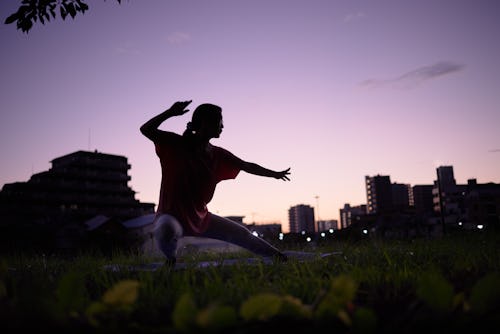Fitness
The Difference Between Tai Chi & Yoga, Explained By A Trainer
Gentle movements and synced breathing? Check. Here’s what else to know.

As you’re heading back to your gym and trying to figure out which classes fit in with your new commute, you might find yourself torn between the different options. If you’re looking to boost your physical and mental fitness in one fell swoop, tai chi and yoga might both be vying for your 8 a.m. workout spot. But how do you choose between tai chi and yoga?
What Are The Differences Between Tai Chi & Yoga?
Tai chi originated in China and is considered an internal martial art. “Tai chi uses forms or predetermined sequences that focus on flowing, controlled movements; different stances; optimal posture; and rhythmic upper and lower extremity movements,” says Prentiss Rhodes, a National Academy of Sports Medicine (NASM) certified personal trainer and corrective exercise specialist. The practice places a big emphasis on your breathwork while moving.
Yoga also focuses on flowing, controlled movements synced with your breathing, but Rhodes explains that the two practices are executed differently. “While yoga has some flow aspects to it, especially if one practices the Vinyasa style,” Rhodes says, tai chi is more dynamic. If you’ve ever stayed in Warrior II for a few full breath cycles, you’re probably familiar with the burn of holding yoga poses. But tai chi focuses more on cycling through relaxed postures than holding any given position. Because of that, tai chi is less likely to leave your muscles sore than yoga.
Of course, there are plenty of gentle yoga flows and more physically intensive tai chi practices — but on average, anticipate breaking more of a sweat during yoga class.
What Are The Similarities Between Tai Chi & Yoga?
“Both yoga and tai chi are meditative, require focus, and help improve the strength and flexibility of the body,” Rhodes explains. “Both systems use coordinated breathwork when they are being performed.” You won’t need a lot of space for either of these movement practices — roughly the space of a yoga mat should do it. Both forms of exercise are low-impact and will be pretty easy on your joints.
It’s not just about the similarities between the practices — it’s also about the benefits. Tai chi and yoga have both been shown to help with high blood pressure and reduce depression, stress, and anxiety. Both practices can also improve your balance, full-body coordination, and your ability to sync your breath up with your movements, Rhodes explains.
Should I Practice Tai Chi Or Yoga?
You’re not cheating on your yoga instructor when you head to a Saturday morning tai chi class. Yoga and tai chi aren’t in competition with each other — instead, they’re pretty complementary. So you don’t have to look at it as one or the other: both are good. The choice on which class to attend is more about your own personal preferences.
Experts:
Prentiss Rhodes, National Academy of Sports Medicine (NASM) certified personal trainer, corrective exercise specialist
This article was originally published on